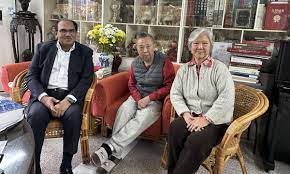Former Pakistani special envoy for CPEC sees big changes in China, vowing to dispel misconceptions

Beijing: With decades of work experience, from economic trade to cultural exchange, from helping China understand Pakistan to introducing China in Pakistan, Zafar Uddin Mahmood, former special envoy for the China-Pakistan Economic Corridor (CPEC) noted that he has gradually transitioned from being China’s “guest” to becoming China’s “messenger,” as he gets even closer to the career he has been pursuing, said the expert during an exclusive interview with the Global Times. The journey with China began in 1976 when he arrived to study Chinese at the Beijing Language Institute (the current Beijing Language and Culture University). “I have so many memories of my school. I remember taking classes inside tents after the 1976 Tangshan Earthquake happened. I remember making many friends who were studying Chinese at our school and have now become important political figures in different countries,” he said. But one of his more cherished memories was spending the eve of the Chinese Lunar New Year with his teacher’s family.

At the time, ration coupons were needed for many necessities and household items in China as the country grappled with a shortage of food and materials. His teacher’s family didn’t eat meat for an entire year just to save up the coupons to buy beef and flour to make dumplings for the Muslim students. The teacher even bought a new pot to boil the dumplings in, as his old pot may have been used to cook pork, Mahmood recalled emotionally. “I am moved to this day. It was not his job.
Meanwhile, it showed how Chinese people treat guests and their spirit of inclusiveness despite the hardships back then. China has so many people and different ethnic groups who respect and embrace each other, which is very important,” he said. “I had a strong bond with my school. The teachers didn’t just teach me the language but also teach me about Chinese culture.” In 1977, Mahmood began his university life in Guangzhou, South China’s Guangdong Province, in the same year when China’s national college entrance exams, Gaokao, resumed. A special cohort of students comprised Mahmood’s class, ranging in age from early 20s to late 40s. Driving force “And now China’s education system has achieved great things. Take universities for example; the quality of China’s higher education is top-level and the majors are becoming more and more refined, so there are specific talents in almost any field. I think this is probably the biggest driving force for China’s development,” Mahmood noted. During his college days, he made the acquaintance of famous painter Lin Yong and calligrapher Su Hua. He introduced them to the Pakistani Embassy, which led to several visits by the two artists to Pakistan under the government’s invitation and the hosting of exhibitions. He accompanied Lin and Su on their visits to Pakistan as an interpreter, and assisted Lin in publishing his collection in Pakistan, where he was later awarded the Medal of Excellence by the Pakistani president for his work. “We are still very good friends now, and I visited them last week when I went to Guangzhou,” Mahmood said. After graduation, he made promoting China-Pakistan-friendly exchanges his career goal. “In 1982, I began a nine-year stint at an international bank’s branch in China. That experience was crucial for me to accumulate diplomatic experience and broaden my international perspective, laying the foundation for my later involvement in various China-Pakistan affairs,” he said.
This job led him to work in different cities across China and gain more comprehensive insights about the nation. He got the opportunity to meet a lot of Chinese diplomats and important national leaders. When he returned to Pakistan after his posting at the bank ended, he started a career in business consultancy, specifically focused on promoting cooperation between China and Pakistan. Building bridges “As the China-Pakistan friendship deepened, I was fortunate to be increasingly recognized by more people,” said Mahmood. In 1999, he began serving as the Commercial Counselor at the Pakistani Embassy in China. In 2004, he was appointed as the first Consul General at the Consulate General of Pakistan in Shanghai. “This was a precious opportunity that allowed me to expand my work from the economic and trade to the cultural field, and it also elevated my mission of promoting Pakistan-China friendship to a new level.” In 2014, Mahmood was appointed as the special envoy for the CPEC, having witnessed the benefits brought to and changes faced by Pakistan through the Belt and Road Initiative.
To dispel misconceptions and foster a deeper understanding of contemporary China globally, he later founded the Understanding China Forum, a Pakistan-based think tank. I hope the forum will help more people to accurately comprehend China and provide them with correct and new information about China.” When asked what resonated with him the most in his decades in China, Mahmood said culture. “Culture is the soul and pillar of a country, containing a nation’s historical traditions and spiritual demeanor. My experience as a special envoy for the CPEC has also made me more profoundly realize the importance of culture in international exchanges. The cultural values in the trade of goods, the cultural genes preserved in personal exchanges, the cultural traditions engraved in strategic communications all of these are important factors in how culture influences the direction of relations between two countries. Â “My bond with China began with the appeal of its excellent culture, and ultimately it will return to the cause of conveying culture and genuine emotions between peoples of different countries. My story with China will continue to be written, welcoming a better future.”





